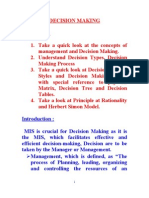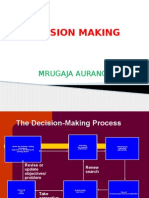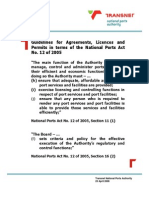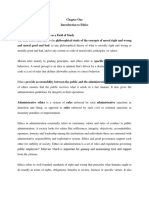Authority
Uploaded by
ChamindaLakmalAbeysekaraAuthority
Uploaded by
ChamindaLakmalAbeysekaraAuthority & Responsibility
Authority – The right to give orders or valid instructions
Responsibility – This is Obligation to achieve certain objectives
Accountability – This is the obligation to report (give an account) to higher authority for
the discharge of those responsibilities.
• Accountability thus flows upwards in an organization, while responsibility is
assigned downwards.
The relationship which exists between three concepts, then, must be in balanced –
responsibility and authority must go hand in hand, and accountability cannot be expected
and flow upwards unless authority and responsibility have first flowed down.
Usually subordinates are given responsibility for the duties assigned to them by their
manager and are accountable to him for their performance.
Centralization & Decentralization
• Centralization is characterized by decision making being undertaken at the top
levels, while actual work is carried out at the lower levels.
• Decentralization refers to the systematic devolution (transference of power) of
responsibility and authority within the structure of an organization.
By centralization or decentralization it does not mean the division of organization into
departments or sections.
It is where decisions are made that determines the degree of centralization, and it is quite
possible for an organisation to have many divisions, all of which are strictly controlled
from a single central source of authority.
• Organisations cannot be totally centralized or decentralized.
Usually with complete centralization no-one other than a small group of senior managers
could make any decisions – the results would be that the organization would be paralyzed
and unable to function.
What are the Advantages of Centralization?
1. Central authority ensures corporate integrity to the organization and preventing
excessive departmentalism.
2. Senior management needs to be seen as providing leadership for the organization
as a whole, ensuring that the various parts perform as a team within corporate
objectives.
Prepared by Nishan Wimalachandra Please refer a relevant study material Authority
www.nishanw.org page1
3. In the event of disputes between departments or division, or between departments
and the corporate whole, central authority takes on the role of referee in the
resolution of conflict.
4. Centralized authority is necessary for the making of corporate policy and
determining strategic plans across the whole organization.
5. It also fulfills other functions such as standardizing procedure and approaches
which are defining and promoting a unity and style and purpose in respect of issue
and practices across the organization such as equal responsibilities practice.
6. It also fulfills the purposes of crisis management which is the determination of
action which can be effective across the whole organization in response in serious
emergencies.
What are the Advantages of decentralization?
1. Decentralization aims to place the authority to make decisions at points as near as
possible to where there are relevant activities take place.
2. It utilizes local and immediate knowledge of situations in order to make the
timely and effective decisions within the defined spare of action.
3. This is in contrast to centralized decision making which is remote from the point
of impact.
4. There is, therefore a clear potential gain in the quality of decision making, but it
must be confined to those situations which do not have wider impact that the area
of responsibility of the decision maker.
5. It encourages initiative, stimulates job satisfaction and includes moral by
providing individuals with more control over their work and involvement with the
objectives of the organization.
6. It fosters the development of managerial ability at lower levels.
What are the disadvantages of decentralization?
1. The principal problem is one of the autonomy of decentralized units, where
independence from the centre can lead to working against corporate policy.
2. Centralized authority can lose touch with the details of operations in
decentralized parts of the organization, and the decentralized unit can lose touch
with its role as parts of the whole.
3. It is a disadvantage because of the possibility that decision making is very close
to an often involves the affected parties, it can actually turn out to be relatively
slow and represent a compromise based on the need for acceptance.
4. Decentralization depends on effective management at the lower levels, and this
is likely to require extensive training which will be costly to the organization.
5. Decentralized operations may lead to the duplication of work which will be
again a cost.
Prepared by Nishan Wimalachandra Please refer a relevant study material Authority
www.nishanw.org page2
Why effective decentralization?
Decentralization will be needed when the organization is in the process of growing in the
size, as well as when it wants to increase the need for flexibility and responsiveness in its
operations.
• According to Handy Peters, not only the degree of decentralization that is
important, but also the way in which it is implemented.
• Decentralization is not merely the delegation of authority, but the means of
breaking with the traditional hierarchical forms.
What Delegation?
Delegation is the passing of responsibility of one level of management to a lower level.
Why do managers refrain from delegating or why it is not practiced often?
1. It takes more time to explain what to do than to do the work oneself.
2. Subordinates lack the knowledge, skills and experience necessary – if you want
something done properly the only way is to do it yourself – attitude.
3. Lack of trust in subordinates – the potential consequence of mistakes being made
is too great or costly (or may reflect badly on the manager)
4. Subordinates do not want additional responsibility, especially without additional
pay or reward.
5. Sometimes managers are scared to delegate because they are afraid to lose their
job of their subordinates performs better than them.
What is the process of delegation?
• Planning
The identification of tasks and functions which could usefully be delegated.
The selection of a suitable subordinate or group of subordinates considered
capable of assuming the responsibility.
• Specification of the terms of the delegation.
Determination of the objectives and scope of the responsibility to be delegated
and communication or explanation of the terms to the subordinates.
• Monitoring and review
Checking progress and results in suitable intervals.
When a manager delegates responsibility to another, he still is accountable to another
senior manager regarding the delegated matter.
When a manager delegates he should be prepared to live with the problems and
consequences which will arise out of the delegated work.
Subordinate’s performance should be judged against the objectives and standards
associated with the responsibility, not against how the manager would do it.
Prepared by Nishan Wimalachandra Please refer a relevant study material Authority
www.nishanw.org page3
What is Participation?
Participation is all about involving people in their work in a more meaningful way
usually through taking part in the decision making process usually reserved for
management alone.
What are the main things to be concerned in participation?
• Capacity & willingness of the management, and the capacity and willingness of
the subordinates.
• Time, communication and cost also should be considered.
What is Empowerment?
Empowerment is a development from delegation. When delegation is integrated into the
work organization as permanent feature of the operating principles and practices,
employees are given increased responsibility for their own work and are allowed to work
with more independence, they become “empowered” and relieved of detailed instructions
and controls.
Empowerment is a process to increase efficiency and make greater use of each
individuals contribution. It implies synergy – the total is greater than the sum of the parts
added.
Empowerment is also about ownership, it is a way involving people in the operations
of the organization, so that they feel personal responsibility for their actions.
Prepared by Nishan Wimalachandra Please refer a relevant study material Authority
www.nishanw.org page4
You might also like
- HLF913 AuthorizedRepresentativenInformationSheet V01No ratings yetHLF913 AuthorizedRepresentativenInformationSheet V011 page
- Authority, Responsibility & Accountability100% (1)Authority, Responsibility & Accountability12 pages
- Introduction To Human Behavior in OrganizationNo ratings yetIntroduction To Human Behavior in Organization47 pages
- Advantages and Disadvantages of DecentralizationNo ratings yetAdvantages and Disadvantages of Decentralization6 pages
- 01 Planning - Planning Premises - Planning ProcessNo ratings yet01 Planning - Planning Premises - Planning Process15 pages
- Leadership Ethics and Social ResponsibilityNo ratings yetLeadership Ethics and Social Responsibility19 pages
- Servicom and Service Delivery in FMC, Yenagoa, 2021No ratings yetServicom and Service Delivery in FMC, Yenagoa, 202130 pages
- Manual For Integrated District Planning - Planning Commissio100% (23)Manual For Integrated District Planning - Planning Commissio173 pages
- Meeting Management: Elements of Effective MeetingsNo ratings yetMeeting Management: Elements of Effective Meetings21 pages
- Organizational Behavior: Leadership: Topic 10No ratings yetOrganizational Behavior: Leadership: Topic 1027 pages
- Final Copy Bse 2203 Special Education Administration and ManagementNo ratings yetFinal Copy Bse 2203 Special Education Administration and Management10 pages
- Local Planning and Resource Mapping in NepalNo ratings yetLocal Planning and Resource Mapping in Nepal11 pages
- Case Studies On Leadership and Change: Module Guide 2018-2019 International Business SchoolNo ratings yetCase Studies On Leadership and Change: Module Guide 2018-2019 International Business School12 pages
- Presentation On Centralization and DecentralizationNo ratings yetPresentation On Centralization and Decentralization15 pages
- Step 1: Setting Performance Standards Performance Standards May Be SetNo ratings yetStep 1: Setting Performance Standards Performance Standards May Be Set9 pages
- Organizational Structure & Design of Confidence Group PDFNo ratings yetOrganizational Structure & Design of Confidence Group PDF20 pages
- Uganda Management Institute (Umi) : CourseNo ratings yetUganda Management Institute (Umi) : Course11 pages
- Week 1: Directing and Managing Project ExecutionNo ratings yetWeek 1: Directing and Managing Project Execution10 pages
- Impact of Organizational Learning On Organizational Success Case Study On Commercial Bank of Ethiopia Shashemene Town100% (1)Impact of Organizational Learning On Organizational Success Case Study On Commercial Bank of Ethiopia Shashemene Town70 pages
- Leadership and Management Onyinye OparaNo ratings yetLeadership and Management Onyinye Opara50 pages
- Management Principles & Practice: Tinku Ibmr-HNo ratings yetManagement Principles & Practice: Tinku Ibmr-H15 pages
- Guidelines For Agreements, Licences and Permits PDFNo ratings yetGuidelines For Agreements, Licences and Permits PDF143 pages
- Considerations Regarding Compliance WithNo ratings yetConsiderations Regarding Compliance With12 pages
- The United Socialist Front The Congress Socialist Party and The Communist Party of IndiaNo ratings yetThe United Socialist Front The Congress Socialist Party and The Communist Party of India12 pages
- A Kind of Coup - by Ronald Dworkin - The New York Review of BooksNo ratings yetA Kind of Coup - by Ronald Dworkin - The New York Review of Books3 pages
- Press Release - MyHSR Corp To Launch Project Delivery Partner (PDP) Tender For The KL-SG HSR ProjectNo ratings yetPress Release - MyHSR Corp To Launch Project Delivery Partner (PDP) Tender For The KL-SG HSR Project2 pages
- I Choose The Best Answer A, B, C or D To Complete Each Gap in The Following SentencesNo ratings yetI Choose The Best Answer A, B, C or D To Complete Each Gap in The Following Sentences12 pages
- 6-Decent Work Country Programme Iraq - Recovery and Reform (2019 - 2023)No ratings yet6-Decent Work Country Programme Iraq - Recovery and Reform (2019 - 2023)38 pages
- Addendum - Dual Employement Clause - Cooling Period - RSANo ratings yetAddendum - Dual Employement Clause - Cooling Period - RSA2 pages
- Notice: Human Drugs: New Drug Applications— Draft Guidance On M5 Data Elements and Standards For Drug DictionariesNo ratings yetNotice: Human Drugs: New Drug Applications— Draft Guidance On M5 Data Elements and Standards For Drug Dictionaries2 pages
- HLF913 AuthorizedRepresentativenInformationSheet V01HLF913 AuthorizedRepresentativenInformationSheet V01
- 01 Planning - Planning Premises - Planning Process01 Planning - Planning Premises - Planning Process
- Servicom and Service Delivery in FMC, Yenagoa, 2021Servicom and Service Delivery in FMC, Yenagoa, 2021
- Manual For Integrated District Planning - Planning CommissioManual For Integrated District Planning - Planning Commissio
- Meeting Management: Elements of Effective MeetingsMeeting Management: Elements of Effective Meetings
- Final Copy Bse 2203 Special Education Administration and ManagementFinal Copy Bse 2203 Special Education Administration and Management
- Case Studies On Leadership and Change: Module Guide 2018-2019 International Business SchoolCase Studies On Leadership and Change: Module Guide 2018-2019 International Business School
- Presentation On Centralization and DecentralizationPresentation On Centralization and Decentralization
- Step 1: Setting Performance Standards Performance Standards May Be SetStep 1: Setting Performance Standards Performance Standards May Be Set
- Organizational Structure & Design of Confidence Group PDFOrganizational Structure & Design of Confidence Group PDF
- Impact of Organizational Learning On Organizational Success Case Study On Commercial Bank of Ethiopia Shashemene TownImpact of Organizational Learning On Organizational Success Case Study On Commercial Bank of Ethiopia Shashemene Town
- Guidelines For Agreements, Licences and Permits PDFGuidelines For Agreements, Licences and Permits PDF
- The United Socialist Front The Congress Socialist Party and The Communist Party of IndiaThe United Socialist Front The Congress Socialist Party and The Communist Party of India
- A Kind of Coup - by Ronald Dworkin - The New York Review of BooksA Kind of Coup - by Ronald Dworkin - The New York Review of Books
- Press Release - MyHSR Corp To Launch Project Delivery Partner (PDP) Tender For The KL-SG HSR ProjectPress Release - MyHSR Corp To Launch Project Delivery Partner (PDP) Tender For The KL-SG HSR Project
- I Choose The Best Answer A, B, C or D To Complete Each Gap in The Following SentencesI Choose The Best Answer A, B, C or D To Complete Each Gap in The Following Sentences
- 6-Decent Work Country Programme Iraq - Recovery and Reform (2019 - 2023)6-Decent Work Country Programme Iraq - Recovery and Reform (2019 - 2023)
- Addendum - Dual Employement Clause - Cooling Period - RSAAddendum - Dual Employement Clause - Cooling Period - RSA
- Notice: Human Drugs: New Drug Applications— Draft Guidance On M5 Data Elements and Standards For Drug DictionariesNotice: Human Drugs: New Drug Applications— Draft Guidance On M5 Data Elements and Standards For Drug Dictionaries

























































































